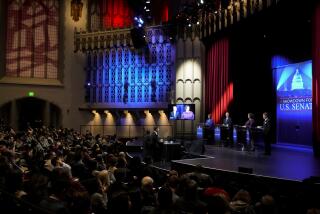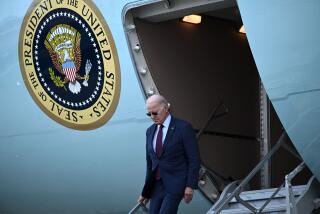Obama, McCain differ sharply on foreign policy
John McCain and Barack Obama differed Friday night over spending, Iraq, diplomacy and who could best change Washington during a wide-ranging and largely polite presidential debate that took place after the Republican nominee abandoned plans to skip the event.
With the economic crisis providing an ominous backdrop for the 98-minute discussion, the two senators were asked if they would support the bailout legislation taking shape on Capitol Hill. Neither would commit without knowing the details, but each claimed foresight in anticipating the debacle.
Obama declared the crisis a culmination “of eight years of failed economic policies promoted by President Bush and supported by Sen. McCain.” It was one of many attempts by the Democrat throughout the evening to tie the GOP hopeful to the unpopular incumbent.
McCain blamed the economic siege on greed and corruption on Wall Street as well as in Washington, a problem he said he had fought for years, often against opponents in his own party. The 26-year congressional veteran repeatedly touted his record, drawing an implicit contrast with Obama, a freshman senator.
“Reform, prosperity and peace,” McCain said near the close of night. “These are major challenges to the United States of America. I don’t think I need any on-the-job training. I’m ready to go at it right now.”
The debate’s stated topic was foreign policy and national security, and those subjects produced some of the liveliest exchanges. But much of the discussion on the stage at the University of Mississippi was focused on the economy under the questioning of PBS’ Jim Lehrer, who served as moderator.
Both candidates acknowledged they would have to retool their ambitious campaign agendas given the enormous Wall Street bailout bill facing Washington. Neither offered specifics, though McCain said he would start by targeting wasteful spending. “How about a spending freeze on everything but defense, veterans and entitlements?” McCain asked.
Obama quickly rejected the notion. “The problem with a spending freeze is using a hatchet when you need a scalpel,” the Illinois senator replied, citing early-childhood education as the kind of program that deserves more funding.
McCain accused Obama of favoring a broad-based tax hike and said that was “the worst thing we could do in this economic climate.” Obama countered that McCain was distorting his plan and said he would cut taxes for all but the wealthiest Americans. “What I’ve called for is a tax cut for 95% of working families,” Obama said. “Ninety-five percent,” he repeated.
Though the candidates exchanged a few sharp words and sometimes talked over each other, the atmosphere inside the Oxford performing arts center was decidedly low-key. The most emotion either man showed was an irritated smile or a rueful shake of his head. Most of the time each candidate seemed to avoid looking at the other.
Some of the starkest differences emerged over foreign policy, and in particular the war in Iraq. Obama has called for ending the war; McCain contends that the fight is central to combating terrorism and stabilizing the Middle East. “If we snatch defeat from the jaws of victory and adopt Sen. Obama’s plan, then we will have a wider war and it’ll make things more complicated throughout the region,” McCain said.
Obama described McCain and the Bush administration as overly focused on Iraq, saying the United States had squandered resources on the war while borrowing billions from China and failing to spend enough on healthcare, science and technology. “What we are talking about is recognizing that the next president has to have a broader strategic vision about all the challenges that we face,” he said. “That’s been missing over the last eight years. That sense is something that I want to restore.”
Obama said that before last year’s U.S. military buildup that helped stabilize Iraq, which McCain supported and Obama opposed, the Arizona senator’s assessments of the war were repeatedly wrong.
“When the war started, you said it was going to be quick and easy,” Obama told him. “You said we knew where the weapons of mass destruction were. You were wrong. You said that we were going to be greeted as liberators. You were wrong. You said that there was no history of violence between Shia and Sunni. And you were wrong.”
McCain responded that he became a critic of Bush’s war policy early on and urged the change in strategy that has since borne success. “Our troops will come home, and not in defeat,” McCain said. “We will see a stable ally in the region and a fledgling democracy.”
For all their stated differences on Iraq, the two men have largely converged over the course of the campaign. Both have said they would withdraw U.S. troops within the next few years, Obama by mid-2010 and McCain by 2013. Each, however, has offered stipulations that could prolong the military presence.
Afghanistan, which has become a growing threat as a result of the Taliban’s resurgence, provoked another pointed exchange. McCain referred to one of Obama’s more controversial foreign policy positions, his determination to launch a military strike against terrorists inside Pakistan if the Pakistani government refused to act. “Now, you don’t do that,” McCain chided. “You don’t say that out loud. . . . You work with the Pakistani government.”
Obama countered: “Nobody talked about attacking Pakistan.” He then ridiculed McCain for once singing -- to the tune of a Beach Boys song -- “Bomb, Bomb Iran.”
“Coming from you, who in the past has threatened extinction for North Korea and, you know, sung songs about bombing Iran, I don’t know . . . how credible that is,” Obama said.
The two also clashed over the best approach to diplomacy, with Obama reiterating his willingness to meet with U.S. enemies. “This notion by not talking to people we are punishing them has not worked,” he said, adding a moment later, “I reserve the right, as president of the United States, to meet with anybody at a time and place of my choosing if I think it’s going to keep America safe.”
He added that that “doesn’t mean you invite them over for tea one day. What it means is that we don’t do what we’ve been doing, which is to say, ‘Until you agree to do exactly what we say, we won’t have direct contacts with you.’ ”
Obama said that Bush had come around to that view and that it is also a position endorsed by one of McCain’s foreign policy advisors, former Secretary of State Henry Kissinger. McCain vigorously disagreed, repeatedly citing Iran’s president, Mahmoud Ahmadinejad. “What Sen. Obama doesn’t seem to understand [is] . . . if without precondition you sit down across the table from someone who has called Israel a ‘stinking corpse’ and wants to destroy that country and wipe it off the map, you legitimize those comments,” McCain said. “It isn’t just naive. It’s dangerous.”
Obama responded that “the notion we would sit down with Ahmadinejad and not say anything while he’s spewing his nonsense and his vile comments is ridiculous.”
McCain shot back: “He says, ‘We’re going to wipe Israel off the face of the Earth,’ and we say, ‘No, you’re not.’ Oh, please.”
Apart from their policy differences, the two presented a stark physical contrast as they stood a few feet apart behind identical wooden lecterns. At 47, Obama is vying to become one of the nation’s youngest presidents. At 72, McCain would become the oldest first-term White House occupant.
At one point, he appeared to make a joke at his own expense when Lehrer repeated something Obama had said. “Were you afraid I couldn’t hear him?” McCain asked, with a smile.
McCain’s appearance culminated a hectic day that began in Washington with a hastily arranged flight that left most of his traveling press corps behind. A few days ago, the Republican announced he would skip the debate and stay in Washington to help craft legislation addressing the nation’s financial crisis.
The result, however, was more partisan bickering than substantive achievement, and McCain abruptly changed course Friday morning. He dashed to the airport for an early afternoon charter and arrived in Memphis, about an hour’s drive from Oxford, a few hours before the debate.
Aides to McCain said he would return to Washington on Friday night with the intention of working through the weekend on the bailout bill. Obama planned a pair of rallies today with his running mate, Sen. Joe Biden of Delaware, in North Carolina and Virginia.
The two presidential contenders are scheduled for two more debates, on Oct. 7 and Oct. 15. Biden and McCain’s running mate, Alaska Gov. Sarah Palin, are set to debate Thursday.
--
peter.nicholas@latimes.com
Barabak reported from San Francisco and Nicholas from Oxford. Times staff writer Bob Drogin contributed to this report.
More to Read
Get the L.A. Times Politics newsletter
Deeply reported insights into legislation, politics and policy from Sacramento, Washington and beyond. In your inbox three times per week.
You may occasionally receive promotional content from the Los Angeles Times.







